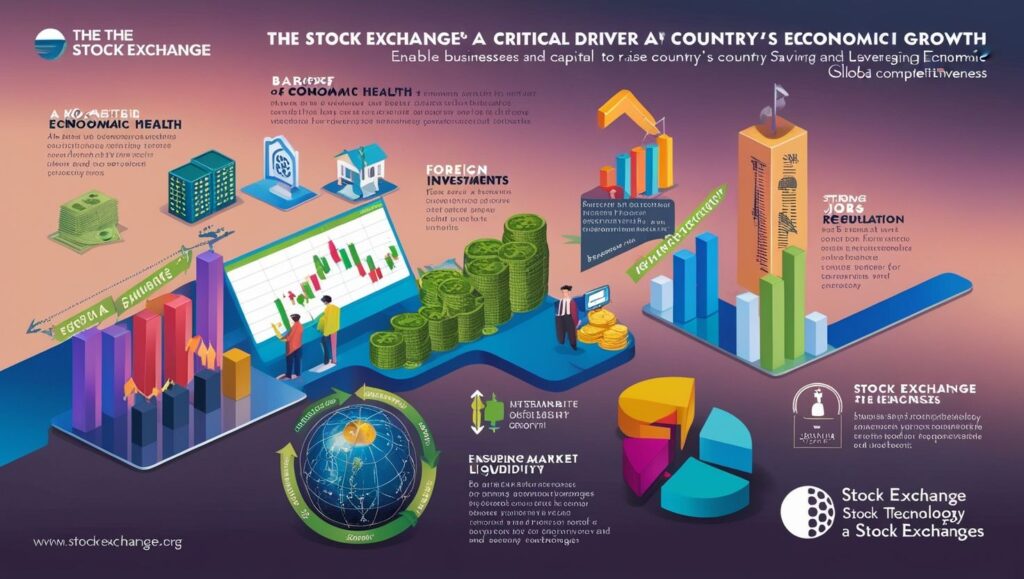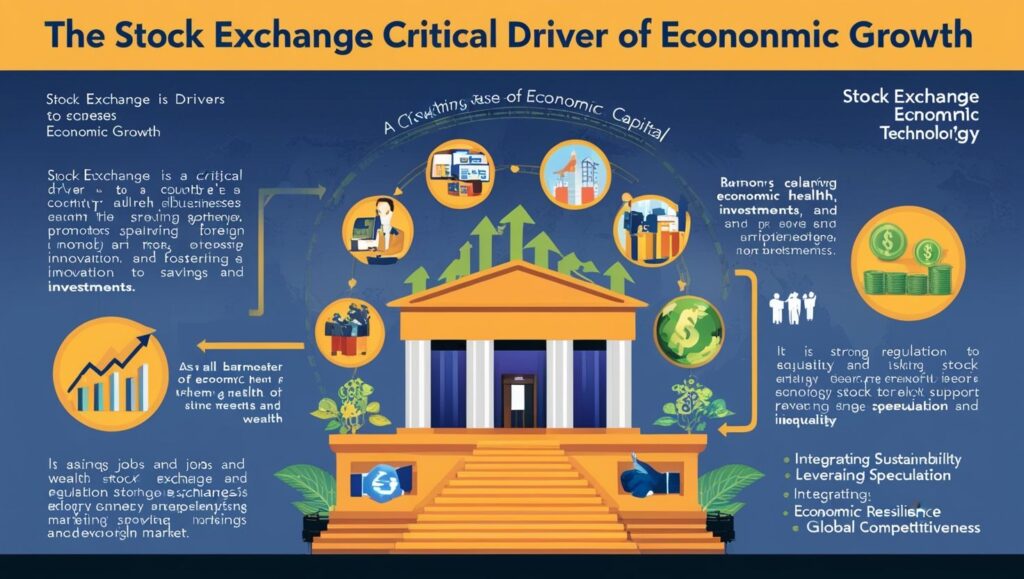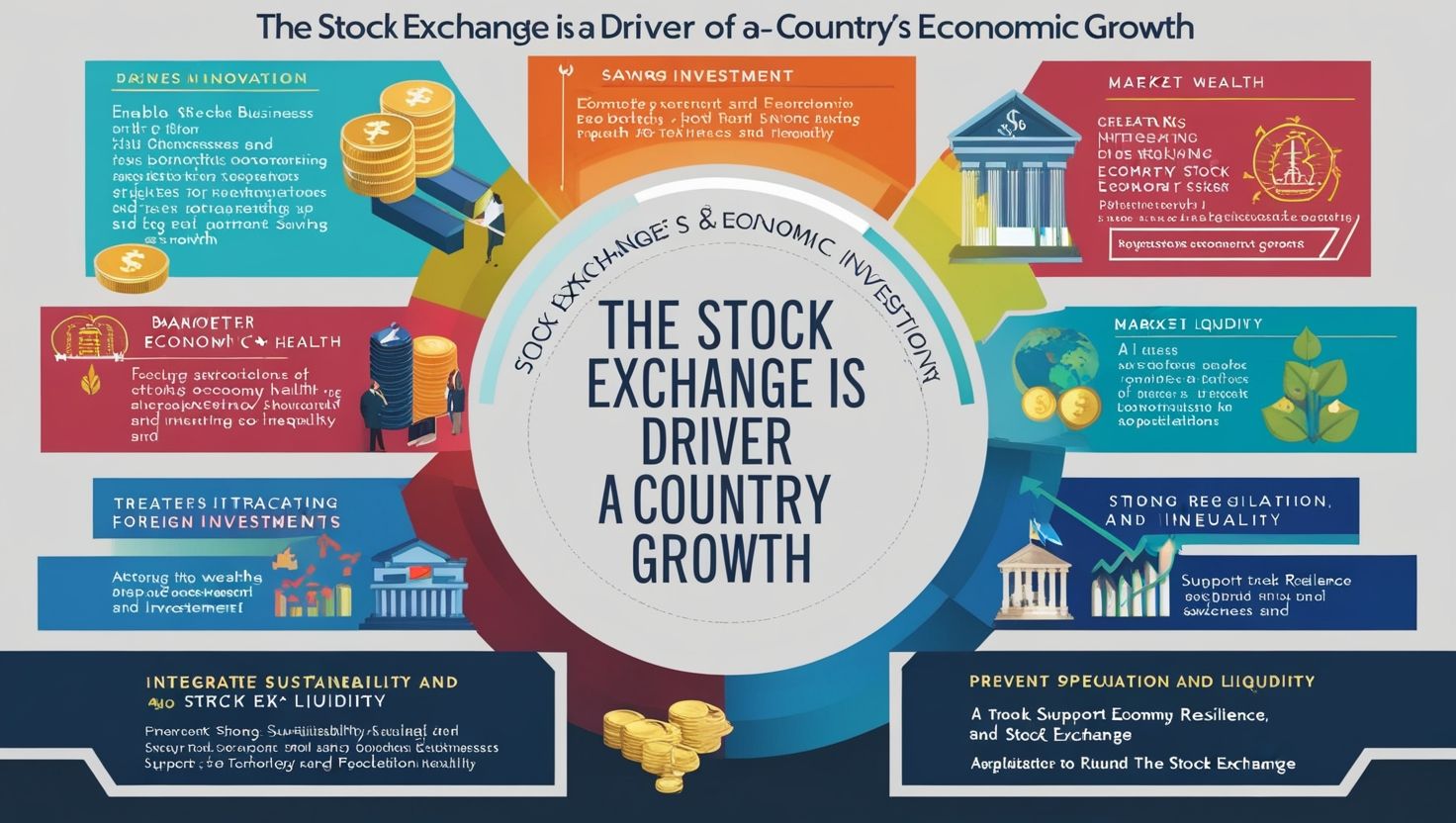Impact of Stock Exchange on the Economy of a Country, A stock exchange is a centralized marketplace where buyers and sellers trade financial securities such as stocks, bonds, and derivatives. It serves as a barometer of a country’s economic health and plays a pivotal role in shaping its economic trajectory. Stock exchanges not only provide a platform for companies to raise capital but also enable investors to channel their savings into productive avenues. The interdependence of stock exchanges and the broader economy underscores their profound impact on national and global economic systems.
1. Capital Formation and Economic Growth
Stock exchanges play a critical role in mobilizing resources for economic development. Companies issue shares to raise funds for expansion, research, or operational activities. This infusion of capital facilitates:
- Business Expansion: Enables firms to invest in new projects, create jobs, and boost productivity.
- Innovation: Supports research and development, fostering technological advancements and competitive industries.
For instance, robust stock markets in countries like the United States have enabled tech giants such as Apple and Microsoft to access capital for global innovation, driving economic growth.
2. Promoting Savings and Investments
Stock exchanges encourage individuals to save and invest. By offering a variety of investment options, including equities, mutual funds, and exchange-traded funds (ETFs), stock markets incentivize long-term savings. This culture of investment:
- Enhances financial literacy and awareness.
- Channels idle savings into productive use, contributing to national wealth.
Countries with a strong investment culture, such as Japan and Germany, often exhibit higher economic stability due to the robust integration of their savings into capital markets.

3. Indicator of Economic Health
Stock exchanges serve as an economic barometer, reflecting the state of a country’s economy through indices like the S&P 500, FTSE 100, or NIFTY 50. Changes in these indices can signal:
- Economic Growth: Rising stock prices often correlate with improved business performance and investor confidence.
- Economic Slowdowns: Declining indices may indicate economic challenges, prompting policymakers to take corrective actions.
The 2008 global financial crisis highlighted the interconnectedness of stock markets and economic stability, with major indices reflecting the turmoil and its impact on global economies.
4. Wealth Distribution and Economic Equity
Stock exchanges can act as instruments for wealth redistribution. When individuals across various socio-economic strata invest in the market, the returns generated contribute to wealth creation. However, disparities can emerge if access to the stock market is limited or unequal.
- Inclusive Growth: Encouraging participation from diverse demographics ensures broader wealth distribution.
- Challenges: Economic inequity can arise if only a fraction of the population benefits from market gains, necessitating regulatory interventions.
5. Foreign Investment and Economic Integration
Globalization has amplified the role of stock exchanges in attracting foreign investments. Foreign Direct Investment (FDI) and Foreign Portfolio Investment (FPI) are critical drivers of economic integration:
- FDI: Companies establish operations in foreign countries, contributing to infrastructure and job creation.
- FPI: Investors acquire stakes in domestic companies, injecting capital into local markets.
Emerging economies such as India and Brazil have leveraged their stock markets to attract foreign investments, boosting their economic standing on the global stage.
6. Liquidity and Financial Stability
Stock exchanges ensure market liquidity, enabling investors to buy and sell securities with ease. High liquidity fosters confidence among investors and promotes financial stability:
- Market Efficiency: Transparent and liquid markets reflect accurate pricing of securities, essential for informed decision-making.
- Crisis Management: During economic downturns, liquidity allows investors to exit positions, minimizing potential losses.
Efficient stock markets in developed economies like the UK or Japan contribute to their overall financial resilience.
7. Impact on Employment and Income Levels
The activities of stock exchanges influence job creation and income distribution. Companies raising funds through stock markets expand their operations, generating:
- Direct Employment: Jobs within listed companies, including manufacturing, services, and technology sectors.
- Indirect Employment: Opportunities in associated industries such as finance, consulting, and logistics.
A flourishing stock market often translates into increased employment rates, as seen in the rise of startup ecosystems supported by capital markets.
8. Challenges and Risks Associated with Stock Exchanges
Despite their benefits, stock exchanges are not without challenges. Economic volatility, speculative activities, and market manipulation can undermine their impact on the economy:
- Economic Disparities: Wealth generation through stock markets may exacerbate income inequality if access is not democratized.
- Speculation: Excessive speculative trading can destabilize markets and lead to economic disruptions.
- Systemic Risks: Global financial systems are interconnected, making economies vulnerable to shocks originating in stock markets.
The 1997 Asian Financial Crisis demonstrated how speculative trading and capital flight from stock markets could destabilize economies.
9. Role of Technology in Stock Exchanges
Advancements in technology have transformed stock exchanges, enhancing efficiency and accessibility:
- Online Trading Platforms: Allow individuals to trade securities seamlessly from anywhere.
- Algorithmic Trading: Improves market efficiency through automated transactions.
- Blockchain Technology: Ensures transparency and security in trading activities.
The adoption of technology in stock exchanges, as seen with Nasdaq’s electronic trading system, has revolutionized global capital markets.

10. Regulatory Framework and Market Stability
To ensure the stability and integrity of stock exchanges, robust regulatory frameworks are essential. Regulatory bodies like the Securities and Exchange Commission (SEC) in the US or the Securities and Exchange Board of India (SEBI):
- Protect investors from fraudulent activities.
- Ensure fair trading practices.
- Maintain market confidence during economic uncertainties.
Countries with stringent regulatory mechanisms experience fewer instances of market manipulation and financial crises.
11. Environmental, Social, and Governance (ESG) Investing
Modern stock exchanges are increasingly emphasizing ESG criteria, aligning investments with sustainability goals:
- Environmental Impact: Encouraging green investments and renewable energy projects.
- Social Responsibility: Supporting companies with equitable and inclusive policies.
- Governance Standards: Promoting ethical corporate behavior and accountability.
Stock exchanges such as the Johannesburg Stock Exchange (JSE) are pioneering ESG practices, integrating sustainability into their operations.
Conclusion
Stock exchanges are indispensable to the economic fabric of a country. By facilitating capital formation, promoting investments, and serving as economic indicators, they influence every facet of economic development. However, their benefits must be balanced with robust regulatory oversight to mitigate risks and ensure inclusivity.
As globalization deepens and technology advances, the role of stock exchanges will continue to evolve, driving innovation and fostering economic resilience. Nations that leverage their stock exchanges effectively can unlock significant economic potential, positioning themselves as competitive players in the global economy.

13 thoughts on “Impact of Stock Exchange on the Economy of a Country”
Comments are closed.